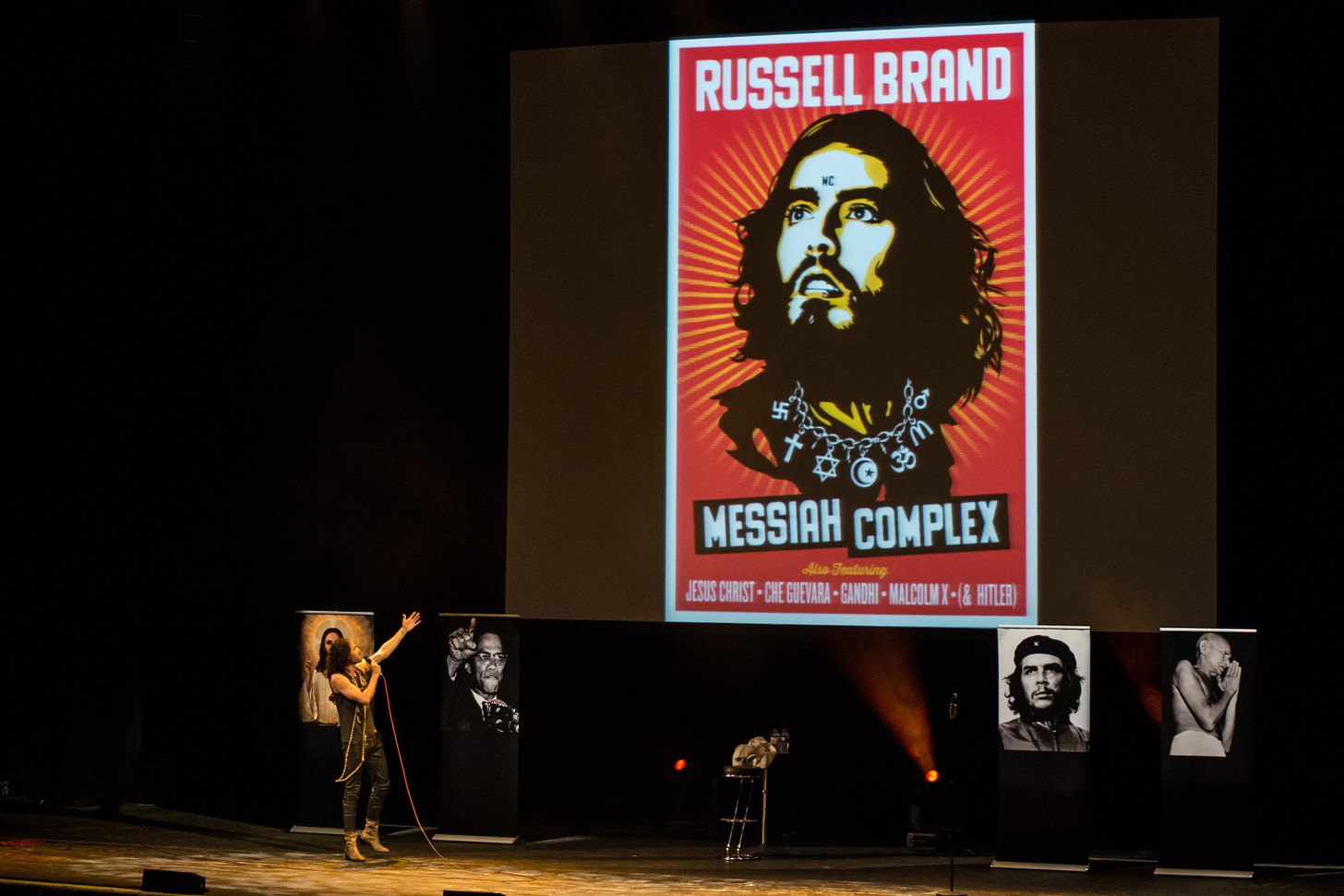The Fictitious Conspiracy Against Russell Brand Would Be the Dumbest Conspiracy of All Time
There’s still no evidence—or plausible reason—that powerful forces coordinated a takedown of Brand because of his anti-establishment takes.

“I’m not going to argue with you on Twitter,” is an excellent mantra of which I can credit Molly Ball for coining.
That’s why this post will serve as a quick followup to the column I published at The Daily Beast on Wednesday, titled, “The Deep State Didn’t Frame Russell Brand, You Idiots.”
I’ll spare you a recounting of the entire piece (which you can just click on the link above and read), but the gist is a number of prominent right-wing commentators have breathlessly pushed the conspiracy theory that Russell Brand’s anti-establishment takes about COVID, Ukraine, and other hot button issues inspired a vast, coordinated plot against him. Specifically, Brand is such a threat to the status quo, such an influential people’s revolutionary, that nefarious forces in government and media sought for a reason—any reason—to take him down.
Their weapon of choice?
Four women who don’t know each other, who were the subjects of a years-long investigation by two British news outlets, who each accused Brand of various forms of sexual assault, and who were able to provide some forms of corroboration.
TAKE A BREATH AND WAIT FOR A TRULY POINTLESS CONSPIRACY THEORY
Brand-stans seized upon a single line in the credibly damning Sunday Times report as though it were a smoking gun, which is that some of the women were motivated to come forward in part due to “Brand's newfound prominence as an online wellness influencer, with millions of followers on YouTube and other sites.”
A person might read that and say, “Makes sense. When serial predators get more popular and financially prosperous, or perhaps when they try to pass themselves off as reformed New Age hippies, their victims who’ve long suffered in silence might decide to stand up and say, ‘Enough. The truth needs to come out.’”
A different person, one who has spent way too much time on YouTube and X (formerly Twitter), might interpret that same line and say, “See! Russell Brand got too close to the truth, so the MACHINE had to destroy him. And besides, some of these allegations are ten years old, and everyone seemed to know he was a creep back when he was a darling of the left, so you’d be a fool to think all of this coming out now isn’t orchestrated.” [editor’s note: He was never a darling of the left. He was a moderately famous comedian and actor best known for being spectacularly unfunny and for having shallow and conspiratorial politics. Another case of Americans mistaking a British accent with sophistication.]
It’s the latter type of person who my column was about, which psychological studies have shown are frequently gullible narcissists:
“I’m no psychologist, but these all sound like the qualities of a person who would look at multiple allegations against a ridiculous talk show host like Brand—backed with some credible evidence indicating serial sexual predation—and say, ‘This is the Deep State’s fault.’”
I also wrote that I oppose YouTube’s instant demonetization of his account, as I don’t think allegations should immediately lead to summary cancellations—but also that YouTube has every right not to do business with Brand.
And I made it very clear where I stand on due process under the law:
“Whether the accused is alleged 9/11 mastermind Khalid Sheikh Mohammed, mass shooters, the wrongly convicted and later exonerated Central Park Five, or preppy college lacrosse players with punchable faces—I believe in the universal rights of a presumption of innocence, the ability to challenge evidence presented against the accused, and a fair trial by a jury that is as impartial as can be found. This applies to the most ‘obviously guilty’ or personally reprehensible, just as it applies to the falsely accused. It’s the universality of the right that endows its strength.
Naturally, I believe Russell Brand should enjoy these same rights if and when he faces criminal charges.”
And then, shortly after my column was published, a letter from a Tory (that would be the right-wing ruling party) member of the U.K. Parliament was made public.
To the Brand-was-targeted-because-he’s-the-hero-we-need-right-now crowd, this was the Zapruder film. Irrefutable proof of a conspiracy against Brand, and irrefutable proof that I am a corporate media stooge who is an unwitting accomplice to (if it were true, which it is not) perhaps the dumbest conspiracy of all time.
In fact, Tim Pool—the free speech tourist who really hates it when you point out that he peddled “Seth Rich leaked to WikiLeaks and then he was murdered by the DNC” conspiracy theories, then deleted those videos, then threatened to sue people who characterize him a “Seth Rich truther”—spent at least a half-hour talking about my column on his YouTube show. Unable to bear his vapid screeching for too long, I had to scan for bits and pieces. Without really engaging in substance, the segment seemed to basically consist of Pool tap-dancing on the grave of a corporate media hack (me) who was just murdered by an excess of egg on his face.
The source of those metaphorical eggs—in Pool and other very serious people’s estimations—were letters sent by MP Dame Caroline Dinenage, chair of the House of Commons’ Culture, Media, and Sport Committee.
Dinenage sent said letters to the bosses of various digital media companies—including TikTok and the right-wing YouTube alternative, Rumble—expressing “concern” that Brand “may be able to profit from his content on the platform.” (Brand’s channel was already demonetized on YouTube, which I oppose, as explained in my Daily Beast column.)
But since bad faith talking points are contagious, allow me to say it plainly: I strenuously object to government officials leaning on private companies over how to conduct their business—especially about who they can or can’t do business with.
Take it with a grain of salt, but Britain’s right-wing GB network reported that Dinenage didn’t even clear all of the letters with her own committee, and some members reportedly objected—which, if true, makes the force of her “threat” far less imposing.
But here’s the thing—anyone with a basic knowledge of U.K.’s speech laws and online regulations knows that they are… not great at preserving free speech. Cops can come to your door for nebulously defined “hate speech,” or for insulting government officials, or for saying mean things about King Charles. That all sucks.
And it gets worse, because this very week, the U.K. passed the Online Safety Bill, which endows the government with sweeping powers to crackdown on digital and social media companies—like TikTok and Rumble. Writing in The Daily Beast, the Electronic Frontier Foundation’s Paige Collings called the Online Safety Bill, “a deeply misguided and flawed law that will make the internet less safe for everyone on Earth.”
So let’s please not act like Dinenage’s letters are somehow out of character with the current state of the U.K. government—which is far more censorious and regulating of the internet and free speech than the U.S. is.
Dinenage’s letters were, in my opinion, an abuse of government authority—but in the U.K., it’s not an abuse at all, it’s the law! (And, as a reminder, it was passed by a conservative-dominated Parliament.)
But these wrong-headed letters are not (repeat, not) evidence of a years-long conspiracy to take down Russell Brand for his politics or bad takes.
Now, back to the alleged victims themselves. It is my opinion that it does not matter how long it took for them to come forward. If they have evidence they are telling the truth, that’s what’s relevant.
Likewise, it is absurd to suggest that these allegations surfaced because journalists were activated by unseen forces to find any reason to take Brand down, because his typically incoherent “anti-establishment” takes about COVID, Ukraine, and the 2020 U.S. presidential election posed a threat level to the status quo not seen since Martin Luther King, Jr. (or something).
That’s because the investigation into Brand’s alleged crimes began in 2019. That would be before all the aforementioned issues—where Brand heroically bucks the establishment—even existed.
As the Times noted:
“In early 2019, The Sunday Times was made aware of allegations against Russell Brand relating to his treatment of women…
“Some mentioned they had previously been approached by other media, but those organisations had never published or broadcast…”
You mean reporters were looking into Brand even before 2019? And one of Brand’s accusers claims he threatened her with legal action if she went public with her allegations?
Oh, how will I ever get all this egg off my face?
The fact is, for every Harvey Weinstein brought down, there remain many other men who enjoy power, influence, and the warm blanket of institutional protection who have yet to answer for their histories of despicable behavior, and ultimately may never have to. I’m personally aware of at least a few of them (as I’m sure most people are) who continue to skate on their crimes because their victims see little upside to blowing the whistle, and a high likelihood of slander and ostracization were they to tell the truth about what happened to them—and who did it. That’s how this works!
I do not know if Russell Brand is guilty. I believe he deserves a presumption of innocence and due process.
But the notion that “old,” heinous crimes are irrelevant simply because they’re the past—and that belatedly bringing them to light can only be explained by malicious intent—is astoundingly stupid and wrong. Worse still is the idea that it’s foul play to hold abusers to account once they’ve reached a level of prominence.
Sunlight is the best disinfectant, so the cliche goes. The spotlight can be just as cleansing.
ONCE MORE FOR THE CHEAP SEATS
To recap:
I am against summary demonetization of people’s online channels based merely on allegations. But I also recognize it is the right of said private companies to do so.
I think the new U.K. internet laws are misguided and, likely, quite dangerous.
The MP who sent “concerned” letters to online companies was wrong, and her letters could be reasonably seen as a form of attempted government coercion.
There remains absolutely no evidence whatsoever that Brand was targeted for his politics or anti-establishment rhetoric, nor is there any evidence of a broader conspiracy of any kind.
However, there is evidence that the Times and Channel 4 journalists who spent years reporting on these allegations did so responsibly, interviewing hundreds of people and obtaining tangible corroboration, and did not publish their findings without a thorough and ethical level of due diligence.
And I believe bullies and abusers deserve to be exposed, however long it takes to do so, and whatever their politics.




Agreed, including with this:
>> I am against summary demonetization of people’s online channels based merely on allegations. But I also recognize it is the right of said private companies to do so.
I additionally agree there is no conspiracy, but I fear that there is an inherent sense at these companies that Brand is “not one of us” because of his recent political shift, and that therefore everyone was faster to drop his monetization than if say Hunter Biden or Cenk Uygur had a YouTube channel and also faced sex assault charges.
I've been thinking about the "demonetization" issue and have come to the conclusion that it's not about taking a moral stand but rather a perhaps pathetic response to protecting their brand (no pun intended!).